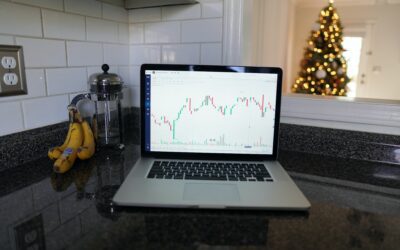Trading’s Toll on Mental Health: The Importance of Discipline and Consistency
Believe it or not, few forces are more powerful in the trading world than an investor’s mindset. Watching your portfolio shift up and down regularly is challenging, and it often moves investors to make decisions based on emotions like fear, worry, and even greed—as opposed to data and personal objectives.
Numerous studies on the subject of “trading psychology” have all found similar conclusions—the long-term success of your trading plan is dependent on two critical factors: your discipline and commitment to consistency (note, too, that these factors apply not just to trading; they apply to long-term investing, as well). Let’s take a look at the psychological impact of trading, as well as the steps you can take to protect your mental health, and, ultimately, your portfolio, by embracing these important traits.
The Psychological Impact of Trading
This Ferrari story is a powerful lesson for us all, especially when it comes to navigating the often-turbulent waters of the financial markets and our personal financial plans. We get caught up in the hype, the predictions, the “should-bes,” and when reality doesn’t mirror those expectations, disappointment rears its ugly head.
There tend to be two primary emotions when trading: greed and fear.
Greed is often apparent when, naturally, the markets are doing well (or the particular investments in one’s portfolio are doing well). Investors see their trades making a profit and it instills a false sense of security and assuredness that the trade will continue to perform well in the future. Greed is common during bull markets when investor sentiment is at its highest. Investors are more inclined to dismiss “red flags” or critical indicators to squeeze out every last dollar they possibly can from their investments. Many investors have no designed or intentional exit strategy, which then means that emotions are even greater decision drivers.
Along with greed can come regret or FOMO (the fear of missing out). These are, again, emotions that can lead investors to make rash, impulsive decisions that don’t serve them well in the long run and negatively impact their mental health.
And on the other end of the spectrum, we have fear. Once those stocks that performed so well start dropping, fear can start to set in—causing, once again, impulsive and emotion-based decision-making to occur. Rather than continue watching an investment lose money, fearful investors may prematurely close out positions or avoid making new trades altogether. Fear is most commonly associated with bear markets, and it’s the primary reason why investors jump ship when markets experience a downturn. Fear can quickly turn into “panic selling,” which is what happens when investors sell off certain stocks on a large scale.
Greed, panic, fear… When traders feel the cycle of these emotions over and over again, it can certainly have a negative impact on their mental health. They may start to resent their portfolio and the market, as opposed to seeing these as wealth-building tools. As a result, they may neglect their investments altogether or make decisions that are too risky (or too conservative) for their financial well-being and goals.
How to Remain Disciplined and Consistent on Your Investment Journey
Understanding the underlying behavior biases that impact your trading journey is important, as it can help you break free from the vicious greed-fear cycle that affects both your financial and mental health long-term. Here are a few tips for staying disciplined and consistent when trading in the markets:
Have An Exit Strategy for Every Trade
You made the buy for a reason. Hopefully, there was some form of analytical process and not just “I want to own that.” When trading, the best traders define their exit criteria upon entry. And they stick to that discipline.
Stay Goal Focused
First and foremost, we recommend shifting from a market-focused mindset to a goal-focused mindset. The markets are going to move up and down, and that’s entirely out of your control. But what is within your control are your long-term goals and the decisions you make to support them.
Constantly tuning into the daily market movements will only increase your stress levels and open you up to making emotion-based decisions. Trading on gut reactions has rarely, if ever, worked out well for investors over the long run. But maintaining a steady focus on your goals can help you avoid the market “noise” and slow down your decision-making process.
Remember, This Too Shall Pass
Rather than see market downturns as “losses,” try thinking of them as temporary reductions in value. We challenge you to eliminate the word “loss” from your investment vocabulary. It may help to think of it this way: A “loss” is when you choose to sell prematurely instead of allowing your investment to recover and grow (now, this may not hold true if the investment you’ve made does not, in general, follow market trends and/or if the investment thesis or financials have been significantly impacted. Here, again, knowing your exit criteria really matters). As long as you stay steady and maintain your position throughout varying market conditions, you’re allowing your investments the opportunity to eventually regain their value.
In general, you may find it helpful to adopt a “this too shall pass” mindset, and remember that the market has historically always recovered from downturns (including those caused by wars, pandemics, and housing crises). Rather than focus on what may feel lost to you, practice gratitude and remind yourself of the successes you’ve already experienced—and remember that there will be more to come in the future.
Tips to help you stay balanced and fulfilled on your investment journey
Shift your focus:
• From market to goals: Don’t get caught up in daily fluctuations. Focus on your long-term objectives and how your investments support them.
• From fear to gratitude: Reframe market dips as temporary reductions in value. Remember historical recoveries and celebrate your successes.
Embrace discipline:
• Define your exit strategy/criteria.
• Work with a professional: Partner with an advisor to hold you accountable and provide objective guidance.
• Reduce exposure in volatility: If market swings cause anxiety, adjust your portfolio allocation when markets are up, not down.
• Maintain an income reserve: Avoid forced sales during downturns by having a buffer for emergencies.
Practice mindfulness:
• Turn away from negativity: Don’t obsess over statements or news during market declines.
• Limit market monitoring: Avoid hourly checks. Focus on long-term trends and annual reviews.
• Embrace mindfulness: Utilize techniques like meditation to manage emotions and stay present.
Work With a Professional to Hold Yourself Accountable
Perhaps one of the most impactful actions you can take when it comes to protecting your financial and mental well-being is to work with a trusted financial professional. Share your goals with them, whether they’re based on your investment objectives or long-term life goals, like retiring early. Your advisor can take the burden and worry of watching the market movements off your shoulders, while also holding you accountable for making healthy, forward-focused decisions.
Because your advisor isn’t personally tied to the portfolio, they can offer objective, data-driven advice designed to reflect your unique goals. If you’d like to speak to a professional about your trading goals and challenges, we encourage you to reach out to our team today.
This material is distributed for informational purposes only. Investment Advisory services offered through Journey Strategic Wealth, an investment adviser registered with the U.S. Securities and Exchange Commission (“SEC”). The views expressed are for informational purposes only and do not take into account any individual’s personal, financial, or tax considerations. Opinions expressed are subject to change without notice and are not intended as investment advice. Past performance is no guarantee of future results. Please see Journey Strategic Wealth’s Form ADV Part 2A and Form CRS for additional information.













